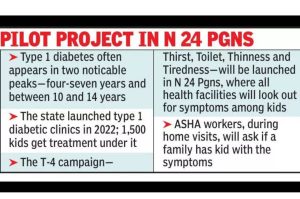West Bengal Launches 4T Campaign: In a landmark move to address the rising incidence of Type 1 diabetes among children, the West Bengal government has announced the launch of the “4T Campaign”. The initiative is aimed at early detection and timely intervention for children showing symptoms of Type 1 diabetes, a chronic condition that can have severe health consequences if left untreated. The campaign is set to roll out initially in North 24 Parganas and is planned for expansion across the state in phases, integrating public health awareness, school-based programs, and community outreach.

West Bengal Launches 4T Campaign: Understanding Type 1 Diabetes
Type 1 diabetes is an autoimmune disorder where the body’s immune system attacks insulin-producing beta cells in the pancreas. Unlike Type 2 diabetes, which is often linked to lifestyle and diet, Type 1 typically develops in childhood or adolescence. Without sufficient insulin, blood sugar levels rise dangerously, leading to complications such as:
- Diabetic ketoacidosis
- Growth and developmental delays
- Long-term organ damage
Early diagnosis is critical. The condition requires lifelong insulin therapy, regular monitoring of blood sugar levels, and strict adherence to dietary and lifestyle recommendations.
What the 4T Campaign Stands For
The 4T Campaign derives its name from the four key warning signs of Type 1 diabetes in children:
- Thirst: Excessive thirst and fluid intake.
- Toilet: Frequent urination, often disrupting daily routines.
- Thinness: Sudden, unexplained weight loss despite normal or increased food intake.
- Tiredness: Persistent fatigue, lethargy, and lack of concentration.
These four signs are critical indicators that parents, teachers, and healthcare workers are being trained to recognize as part of the campaign.
Objectives of the Campaign
The campaign’s overarching goal is to reduce the burden of undiagnosed Type 1 diabetes in children by ensuring early intervention. Specific objectives include:
- Raising Awareness: Educating communities, parents, and educators about the 4Ts.
- Empowering Healthcare Workers: Training frontline health workers, such as ASHAs, to identify symptoms and refer children for testing.
- School Integration: Including educational modules in schools about Type 1 diabetes symptoms, risks, and prevention strategies.
- Community Engagement: Mobilizing local communities to monitor children’s health and seek medical guidance promptly.
- Access to Care: Ensuring children diagnosed with diabetes receive timely insulin therapy, dietary guidance, and follow-up support.


Implementation Strategy
The campaign will be implemented across government hospitals, health centers, and schools in North 24 Parganas as a pilot phase. Key aspects of implementation include:
- Training Programs: Health workers will attend workshops to understand Type 1 diabetes, the 4T symptoms, and patient counseling techniques.
- School Health Checks: Routine school screenings will be conducted, integrating questionnaires to identify children showing potential signs of diabetes.
- Community Outreach: Awareness camps in rural and semi-urban areas will educate parents on the importance of early diagnosis and regular monitoring.
- Monitoring and Reporting: Data collection systems will be established to track diagnosed cases, treatment adherence, and follow-up outcomes.
Support from National and International Agencies
The 4T Campaign has received backing from multiple organizations, ensuring a structured and resource-backed approach:
- National Health Mission (NHM): Providing funding, medical supplies, and personnel training.
- UNICEF India: Supporting awareness campaigns, educational materials, and outreach initiatives.
- Non-Governmental Organizations (NGOs): Collaborating on community education and support programs for families.
This collaboration ensures a combination of medical, social, and educational strategies to address Type 1 diabetes holistically.
Previous Achievements in Pediatric Diabetes Care
West Bengal has already established itself as a leader in pediatric diabetes care. Notable achievements include:
- ISPAD 2025 Award: Recognition for innovation in child diabetes management.
- Statewide Pediatric Clinics: Over 1,500 children in 11 districts currently receive free screenings, insulin therapy, and counseling services.
- Community Engagement Models: Programs initiated in 2022 have effectively trained health workers to identify high-risk children and provide timely referrals.
Challenges Ahead
While the 4T Campaign is promising, several challenges remain:
- Awareness Deficits: Despite growing education efforts, many parents are unaware of Type 1 diabetes symptoms.
- Resource Limitations: Ensuring uninterrupted access to insulin, glucose monitoring devices, and trained personnel remains a challenge in rural areas.
- Psychological Support: Children diagnosed with diabetes and their families often require counseling to cope with lifestyle changes and stress.
- Data Management: Maintaining accurate records and tracking follow-ups across multiple districts requires robust infrastructure.
Future Plans and Expansion
The West Bengal government aims to expand the 4T Campaign to all districts in the state, with additional focus on:
- Telemedicine Integration: Remote consultations to provide expert guidance for families in distant areas.
- School Curriculum Development: Incorporating child diabetes awareness into regular school health programs.
- Capacity Building: Increasing training sessions for health workers to improve early diagnosis and care quality.
- Partnerships: Strengthening collaboration with international health organizations for technical and resource support.
Impact on Public Health
The campaign is expected to have a profound impact on public health in West Bengal by:
- Reducing Late Diagnoses: Early identification of symptoms can prevent severe complications.
- Enhancing Family Awareness: Parents become active participants in monitoring and managing their children’s health.
- Creating a Model for Other States: West Bengal’s structured approach could serve as a model for nationwide pediatric diabetes interventions.
- Promoting Research: Data collected can contribute to studies on Type 1 diabetes prevalence, risk factors, and outcomes in India.
Conclusion
The 4T Campaign represents a comprehensive, multi-pronged approach to addressing Type 1 diabetes in children. By combining community education, healthcare worker training, school integration, and support from national and international partners, West Bengal is taking proactive steps to ensure early detection, timely treatment, and sustainable care for affected children. This initiative not only safeguards children’s health but also reinforces the state’s commitment to preventive healthcare and inclusive public health policy.
External References and Links
- UNICEF India – Health Programs: UNICEF initiatives on child health
- National Health Mission – West Bengal: NHM West Bengal
- World Health Organization – Diabetes in Children: WHO – Diabetes Overview
- PubMed Central – Pediatric Diabetes Care Models: PMC Article

